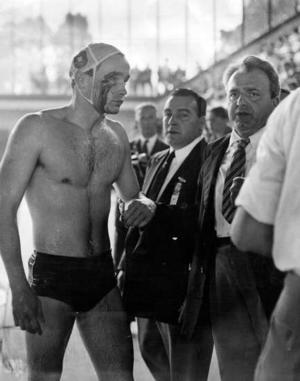Monday Milestone: Blood in the Water
“We felt we were playing not just for ourselves, but for every Hungarian”
– Hungarian water polo player Ervin Zador whose blood made the match famous
This Week in History:
1956, December 6
Hungary, amid the political backdrop of a crushed rebellion from the communist USSR in their homeland, defeat the Soviet Union in the Olympic water polo semi-finals, in a spiteful and angry match, where blood is spilled into the Melbourne pool.
We’re told the modern Olympic movement is about unity, where harmoniously once every four years, the world comes together to celebrate sport as equals.
Here at the Milestone, we call bullshit.
World events don’t stop for the Olympics. The Games have always been a mere sideshow to global political theatre. They don’t transcend it. Throughout history, wars have cancelled Games and there have been boycotts, protests and massacres. Terrorism enjoys no greater stage than when the world is watching. Just ask Munich.
Separating the politics from sport is simply too difficult. Trying to join the full spectrum of races, religions, and cultures in harmony, conveniently forgetting that in the real world many ideologies are diametrically opposed is naive at best.
Case in point was the Soviet Union occupation of war torn Hungary complete with a regime of communist repression that generated political unrest in 1956. When the political tinder box inevitably exploded, student uprisings swept Budapest and wider Hungary was thrust into revolution.
If that wasn't enough, on November 4, thousands of Soviet troops and communist tanks rolled into Budapest in retaliation. Over 2,500 Hungarians were slaughtered, in a bloodbath. The revolution was brutally crushed in a week. A further 200,000 Hungarians would never return home. The international community condemned the communists, whilst on the other side of the world, the Melbourne Olympics were opening.
Against this backdrop, it seems almost an act of destiny that Hungary would hit the pool for an Olympic semi-final against the Soviet Union. Consider the feeling involved – this was the very country responsible for so much death and destruction back home. While their countrymen were fighting for their lives, here in this Melbourne pool, however trivial, was one chance for Hungary to return fire. The feeling was immense as Hungarian flags flew with the communist badge torn out.
From the opening whistle blows were traded, both above and below the water as the Hungarians, taunted their Soviet opponents. The aggression – the kicking, punching and headlocks was unprecedented. Immediately it was evident this was no longer about water polo, nor the Olympics. This was personal.
And it showed. The Hungarians channelled their anger into defending the honour of their crumbling country, leading 4-0 with minutes remaining. Then two-goal hero Ervin Zador, took a hard blow to the face. Blood streamed into the pool, sparking a riot, with Hungarians leaping from the stands to join in. Chaos ensued. The Soviets were ushered away by police, the match was called off. Hungary were proclaimed the winners, and would go on to win the gold. It was a small victory in the scheme of things. Many of them never returned home.
The Games aren’t always about unity. Blood spilled from the revolution into the Olympic pool that day. Yes, Hungary won that match, in 1956, but the Soviet Union ensured the country remained communist for another thirty years. So who was the real winner?
The Milestone Five: Political marrings of the Olympic Games
5. Adolf Hitler famously snubs American Jesse Owens in Berlin in 1936, despite his four gold medals due primarily to the colour of his skin.
4. Tommie Smith and John Carlos raise their fists in the Black Power salute in 1968 after gold and bronze in the 200m athletics.
3. At the height of the Cold War, the Americans boycott the 1980 Olympic Games held in Moscow. The USSRwould return the favour four years later boycotting the 1984 Los Angeles Games.
2. World War I and World War II cancelled the 1916 Games (to be held in Berlin), 1940 Games (to be held in Tokyo) and the 1944 Games (to be held in London).
1. Munich 1972 – Islamic terrorist group Black September captured (and killed) eleven Israeli athletes in the name of the Palestinian Liberation Organisation.

